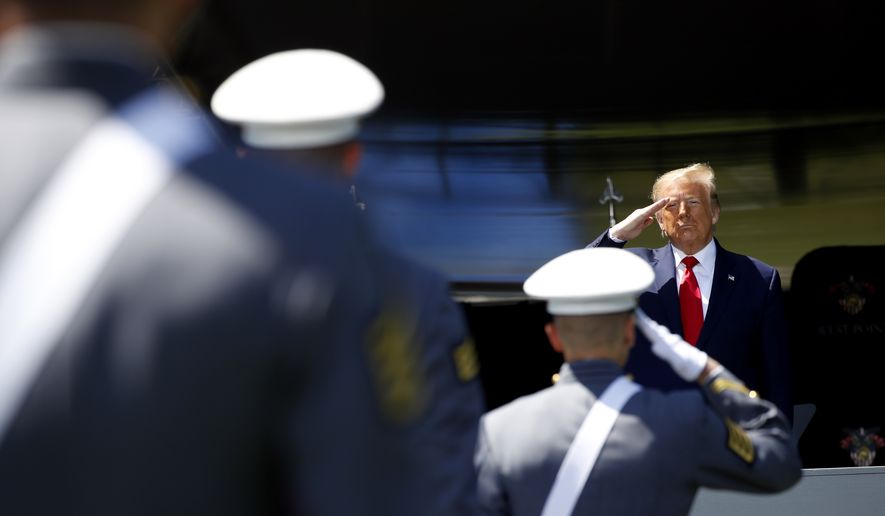This year’s graduating class at the U.S. Military Academy at West Point, New York, will continue a proud “legacy purchased with American blood” in their careers in the armed forces, President Trump said Saturday during a commencement ceremony at the academy.
In an address to the 1,107 West Point graduates, the president praised the role the Army has played throughout history, from the American Revolution to ongoing conflicts in Afghanistan and Iraq.
Mr. Trump also gave a nod to the recent unrest that has swept the nation following the death of George Floyd on Memorial Day, saying the military stands strong in the midst of the “the passions and prejudices of the moment.”
“When times are turbulent, when the road is rough, what matters most is that which is permanent, timeless, enduring and eternal,” Mr. Trump said. “The Army exists to preserve the Republic, and the strong foundations upon which it stands: Family. God. Country. Liberty. And justice.”
Mr. Trump’s decision to speak at Saturday’s West Point ceremony drew criticism from some lawmakers who said that assembling the class during the COVID-19 pandemic was dangerous and unnecessary.
Military officials, however, took great precautions to ensure social distancing at the event. No family or friends were present at the ceremony, and the cadets were seated several feet apart from one another.
The president seemed to relish the chance to escape Washington and speak to a military audience.
“This is your history. This is the legacy that each of you inherits,” Mr. Trump said. “It is the legacy purchased with American blood at the crest of Little Round Top, on the crimson beaches of Normandy, in the freezing mud of Bastogne, and the dense jungles of Vietnam.
“It is the legacy of courageous, selfless, faithful patriots who fought for every inch of dirt with every ounce of strength and every last scrap of heart and drive and grit they had. And they did it because they believed in the undying principles of our founding.”
Mr. Trump mostly avoided politics during his speech. Most notably, he steered clear of recent clashes with top military leaders who decried the White House’s plan to activate U.S. troops to quell unrest in the streets following Floyd’s death.
The plan was abandoned amid a wave of criticism. Top military officials in recent days also have expressed regret for their role in a photo-op Mr. Trump held last week in front of St. John’s Episcopal Church at Lafayette Park — an event that was preceded by the aggressive disbanding of peaceful protesters across the street from the White House.
Army Gen. Mark A. Milley, chairman of the Joint Chiefs of Staff, apologized this week for being present at the event and giving the perception that the military was wading into domestic politics.
The president’s critics expressed similar concerns Saturday.
“Like many, I am concerned about politicization of the military. But today is all about these exceptional young officers,” Sen. Jack Reed of Rhode Island, ranking Democrat on the Senate Armed Services Committee, said in a statement honoring West Point graduates.
Mr. Trump also did not mention a dispute with top military leaders over renaming Army bases currently named after Confederate generals. The president opposes such a move, while Pentagon officials have said they’re open to the idea.
The president did, however, reiterate a key foreign policy principle that has driven decisions throughout his time in office: That the young men and women graduating from West Point should not put their lives on the line to wage “endless wars” in the Middle East.
“We are restoring the fundamental principles that the job of the American soldier is not to rebuild foreign nations but to defend and defend strongly our nation from foreign enemies,” Mr. Trump said. “We are ending the era of endless wars. In its place is a renewed, clear-eyed focus on defending America’s vital interests. It is not the duty of U.S. troops to solve ancient conflicts in far away lands that many people have never even heard of.”
• Ben Wolfgang can be reached at bwolfgang@washingtontimes.com.




Please read our comment policy before commenting.